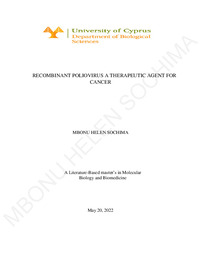| dc.contributor.advisor | Charalambous, Annita | en |
| dc.contributor.author | Mbonu, Helen | en |
| dc.coverage.spatial | Cyprus | en |
| dc.creator | Mbonu, Helen | en |
| dc.date.accessioned | 2022-05-30T13:26:22Z | |
| dc.date.available | 2022-05-30T13:26:22Z | |
| dc.date.issued | 2022-05 | |
| dc.identifier.uri | http://gnosis.library.ucy.ac.cy/handle/7/65245 | en |
| dc.description.abstract | Cancer is a leading cause of global mortality, and its burden is growing despite the availability of standard treatment methods. Genetically and Morphologically tumor cells differ from normal cells. However, cancers arise from genetic modifications of normal cells and these cells may be nearly identical to normal cells, hence, making it difficult to selectively target tumor cells with the current standard cancer therapeutic methods. The ability of oncolytic viruses to specifically replicate within a target host cell and stimulate therapeutic response without disrupting normal cells in the immediate environment confers oncolytic virotherapy with a pharmacokinetic advantage over standard cancer therapies and this creates a pathway to reducing the global morality rate attributable to cancer.
Aim: This review is aimed at illustrating the oncolytic potentials of Recombinant Poliovirus, PVSRIPO, for cancer therapy.
PVSRIPO is a live attenuated, nonpathogenic virus containing the oral poliovirus Sabin type 1 in which the internal ribosomal entry site (IRES) is replaced with the IRES from human rhinovirus type 2 (HRV2). PVSRIPO leads to tumor regression by activating the host antitumor immune response and this process follows the phases of cancer immunoediting namely tumor cell elimination by immune system, balancing and regulating genetically unstable tumor cells and immune cells while preventing the escape of variant tumor cells.
PVS-RIPO a derivate of Picornavirus, has a small virion size (~30 nm in diameter) which confers it with an oncolytic advantage. Furthermore, Picornaviruses have an attribute of rapid replication cycle, and this attribute enables PVSRIPO to effectively replicate and propagate in tumor cells to reverse the immunosuppressed state thereby resulting in tumor regression. The primary studies in this review have illustrated the oncolytic effect of the rapid propagation of PVSRIPO in tumor cells. Furthermore, these studies have indicated that this cytotoxicity of PVSRIPO, occurs in a time and dose dependent manner. For example, most of the studies reported that a single dose of intratumorally administered PVSRIPO was potent to delay tumor growth with a decline in tumor weight within few days.
PVSRIPO is stable and safe for use in oncolytic virotherapy due to the substitution of the poliovirus’ original IRES for the HRV2 IRES. The primary studies in this review have illustrated that upon successful administration of PVSRIPO, there was no evidence of viral neuropathogenicity or virus shedding. In addition, PVSRIPO can be safely used in combination with other systemic therapies.
Preventing side effect while targeting cancer has been a primary source of concern in cancer therapy and PVSRIPO fills this gap by its ability to selectively target the tumor cells without affecting non-tumor cells in the immediate environment due to its natural tropism for CD155, the poliovirus receptor (PVR).CD155 is present in a lot of cancers thereby making PVSRIPO an appropriate agent for eliminating tumor cells.
Conclusion: This review has highlighted the oncolytic potentials of PVSRIPO which was evident in the resulting increased survival rates in both the animal models and clinical trials. Given these illustrations in this review, PVSRIPO is an appropriate agent for cancer therapy. | en |
| dc.language.iso | eng | en |
| dc.publisher | Πανεπιστήμιο Κύπρου, Σχολή Θετικών και Εφαρμοσμένων Επιστημών / University of Cyprus, Faculty of Pure and Applied Sciences | |
| dc.rights | CC0 1.0 Universal | * |
| dc.rights | info:eu-repo/semantics/openAccess | en |
| dc.rights | Open Access | en |
| dc.rights.uri | http://creativecommons.org/publicdomain/zero/1.0/ | * |
| dc.title | Recombinant Poliovirus a therapeutic agent for Cancer | en |
| dc.type | info:eu-repo/semantics/masterThesis | en |
| dc.contributor.committeemember | Apidianakis, Yiorgos | en |
| dc.contributor.committeemember | Georgiades, Pantelis | en |
| dc.contributor.department | Τμήμα Βιολογικών Επιστημών / Department of Biological Sciences | |
| dc.subject.uncontrolledterm | CANCER | en |
| dc.subject.uncontrolledterm | RECOMBINANT POLIOVIRUS | en |
| dc.subject.uncontrolledterm | VIROTHERAPY | en |
| dc.subject.uncontrolledterm | ONCOLYTIC | en |
| dc.subject.uncontrolledterm | TUMOR | en |
| dc.subject.uncontrolledterm | SAFE | en |
| dc.subject.uncontrolledterm | POTENT | en |
| dc.author.faculty | Σχολή Θετικών και Εφαρμοσμένων Επιστημών / Faculty of Pure and Applied Sciences | |
| dc.author.department | Τμήμα Βιολογικών Επιστημών / Department of Biological Sciences | |
| dc.type.uhtype | Master Thesis | en |
| dc.contributor.orcid | Apidianakis, Yiorgos [0000-0002-7465-3560] | |
| dc.contributor.orcid | Georgiades, Pantelis [0000-0001-6497-3221] | |
| dc.gnosis.orcid | 0000-0002-7465-3560 | |
| dc.gnosis.orcid | 0000-0001-6497-3221 | |


